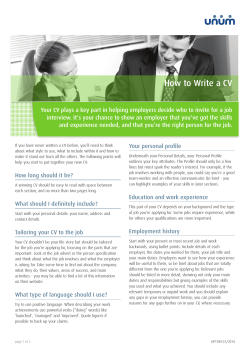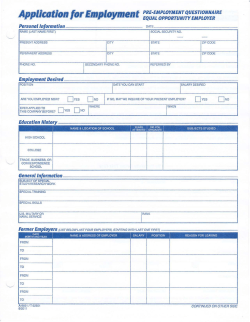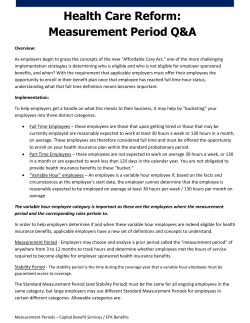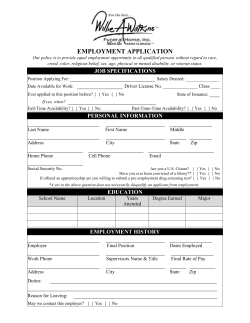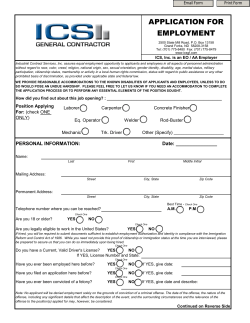
REI May Newsletter 5.18.15
MONTHLY NEWS
MAY 2015 Client Newsletter
Employee Dress Codes + Heat!
What’s in This Issue:
HR
✦
Workplace Wellness
✦
I-9 Noncompliance Fines
✦
Pop Quiz: Managing Leave
✦
Minimum Wage Increases
Balancing the image of the company with the individual rights of employees gets difficult as
the weather heats up. Employers are increasingly confronted with dress code issues, such as
attire that covers tattoos, and claims by employees for harassment and discrimination arise
within various businesses. Employers have to balance the need to have a regulated employee
appearance with the individual rights of each employee which are protected under the law.
Here are a few best practices regarding workplace dress code polices:!
•
Dress code policies should be clear, well-written, and up
to date.!
•
A dress code policy should be job or safety related
(meaning it impacts the business) and not simply based
on the employer's preferences.!
•
Dress codes should be explained to managers and
employees.!
•
The consequences for violation of the dress code should
be explained to managers and employees.!
•
Managers should be trained to consistently and evenly
apply the dress code policies to both men and women,
and amongst other members of protected classes.!
•
Managers should understand that accommodations or
exemptions from the dress code policy may be legally
required and that they should to seek guidance from
Human Resources or legal counsel when making or considering an accommodation.!
Benefits
✦
Urgent Care vs. ER
✦
May Wellness Tip
✦
Cal Perks with CalChoice
✦
401k Webinar
✦
ACA Forms 1094 & 1095
✦
Certificates of Coverage
✦
UHC Members
Compliance
✦
Federal Updates
✦
State-by-State Compliance
✦
Massachusetts,
Washington, Tennessee,
Utah, Pennsylvania
Risk Management
✦
Occupational Heat
Exposure
✦
Online Safety
✦
State of Workers’ Comp
Events & More
✦
Upcoming Webinars
Resourcing Edge Newsletter
Currently, the United States Supreme Court is considering a case which will further define
what is required by an employer with regard to making a reasonable accommodation for its
dress code policy. In EEOC vs. Abercrombie & Fitch
Stores, Inc., Samantha Elauf claimed that she was not
hired at Abercrombie & Fitch, because she wore a
hijab (a Muslim headscarf) at her interview. Abercrombie & Fitch has strict requirements for the
appearance of its employees, including the
prohibition of headscarves. In finding for
Abercrombie & Fitch, the Tenth Circuit found that
Elauf did not tell the Company that she wore her
headscarf for religious purposes, and she did not
request any accommodation for it. Therefore,
Abercrombie & Fitch had no duty to provide her
with an accommodation. The Supreme Court is
reviewing that decision, and a central question
before it is what burdens employers and employees
have with regard to reasonable accommodations to a
company's dress code policy.
1
HUMAN RESOURCES
Severe Fines for I-9 Noncompliance
During the first quarter of 2015, The Office of Chief Administrative Hearing Officer (OCAHO) issued five decisions involving
employer violations related to Form I-9. In its latest decision (United States v. Liberty Packaging, Inc., 2/24/15), OCAHO found that the
employer committed “systematic and deliberate falsification” in Section 2 of Form I-9, after a U.S. Immigration and Customs
Enforcement (ICE) audit revealed that the company’s HR Manager backdated numerous forms between two and 20 years from the
actual date of hire. OCAHO stated in its decision that the company “cannot be said to indicate good faith” in handling its I-9
program and subsequent ICE inspection. ICE proposed a penalty of $19,354, which OCAHO lowered to $11,700 due to the company’s
resources (or lack thereof).!
!
Knowing Hire and
Continuing to
Employ Violations
0% – 9%
First Tier
$375 - $3,200
Second Tier
$3,200 - $6,500
Third Tier
$4,300 - $16,000
$375
$3,200
$4,300
10% – 19%
$845
$3,750
$6,250
20% – 29%
$1,315
$4,300
$8,200
30% – 39%
$1,785
$4,850
$10,150
40% – 49%
$2,255
$5,400
$12,100
50% or more
$2,725
$5,950
$14,050
Substantive
Verification
Violations
0% – 9%
1st Offense
$110 – $1100
2nd Offense
$110 – $1100
3rd Offense +
$110 – $1100
$110
$550
$1,100
You have an employee that twists her ankle on the
job:
10% – 19%
$275
$650
$1,100
20% – 29%
$440
$750
$1,100
Your employee has worked for you for two years
as a server. She has worked a total of 1,485 hours
in the last year.You have 35 employees at one
location and 25 miles away you have 40 employees
at another location. She is pregnant and is planning
to take time off to bond with her baby. She just
slipped in the kitchen and twisted her ankle. She
needs to be off of her feet for 6 weeks for her
ankle to heal.
30% – 39%
$605
$850
$1,100
40% – 49%
$770
$950
$1,100
50% or more
$935
$1,100
$1,100
The penalties for I-9 noncompliance can be
severe and jeopardize a company’s viability. It is
important to retain adequate counsel to
conduct regular I-9 audits, to mitigate or
eliminate any liability to the employer. Here is
the fine schedule released by ICE:!
Managing leaves can be complex, especially when
multiple leave laws may apply to a situation.
!
!
!
!
!
!
How do you handle this time off?
A) Family Medical Leave Act – She has a serious
medical condition that prevents her from working.
B) State Pregnancy Disability Leave – She’s
pregnant and disabled so this leave must apply.
C) Workers’ Compensation Leave – She was hurt
on the job, so it has to be designated as workers’
comp.
!
D) Americans with Disabilities Act – Since she is
disabled, she would have protections under this
law.
!
Resourcing Edge Newsletter
Minimum Wage Increases
San Francisco - The San Francisco minimum wage increased to $12.25
on May 1st. !
!
Chicago - Effective July 1st, 2015 the minimum wage will increase to
$10.00 per hour. This is the first of a series of annual tiered minimum
wage increases that will extend through 2019. Any employer who (1)
maintains a business facility in Chicago or (2) is subject to Chicago
licensing requirements is subject to Chicago’s minimum wage
ordinance.!
!
2
BENEFITS
Urgent Care Center vs. Emergency Room
If the situation requires prompt medical attention but is not life threatening, you
will usually receive faster and more affordable care at an urgent care clinic.
These treatment centers are staffed with professionals equipped to handle
situations that a primary care doctor could, are often open extended hours
including evenings, weekends, and holidays, and are able to see walk-in
patients with minimal wait, saving you time and money.!
Common conditions treated at urgent care clinics include:!
!
!
!
!
!
!
!
!
!
•!
•!
•!
•!
•!
•!
•!
Respiratory infections colds, cough, sore throat, or flu!
Urinary tract infections!
Sprains, strains, or broken bones!
Moderate fevers!
Bruises, abrasions, and minor cuts or burns!
Eye, ear, or skin infections!
Vomiting, diarrhea, or stomach pain!
Reminder:
Special 401k
Webinar
Save the ER visit for a true medical emergency. Symptoms that generally indicate a
medical emergency include:!
!
!
!
!
!
!
!
!
!
•!
•!
•!
•!
•!
•!
•!
Uncontrollable bleeding or deep cuts!
Inability to breathe or severe shortness of breath!
Seizure or loss of consciousness!
Persistent chest or abdominal pain or pressure!
Numbness or paralysis in the face, arm, or leg!
Sudden slurred speech, visual changes (blurred vision), or weakness!
Major burns!
California Corner
CalChoice has rolled out a new feature called “Cal Perks.” If you are currently a
CalChoice member, you can log onto www.calchoice.com, click on the “Cal Perks”
button and see their current discounts on the following:!
· Movie Tickets (AMC & Regal Cinemas)!
· Tickets to pro football, soccer, basketball, hockey,
baseball teams!
· Theme Park tickets!
· Car Rentals!
· Costco & Sam’s Club memberships!
!
!
!
!
!
Resourcing Edge Newsletter
Watch for an invite for our July
webinar about 401k. Tax breaks for
employers is one of the topics we will
discuss. You don’t want to miss it!!
!
On July 23, 2015, at 2:00 CST our 401k
specialists, Transamerica, LPL
Financial and Lone Star TPA will
feature a webinar to offer insight on
how having a 401k can earn employers
tax credits! We will send out
reminders and invitations in the
coming months! !
3
BENEFITS
Affordable Care Act Update
We know that the 1094 and 1095 tax forms are on everyone’s mind right now. We will be
sending out a communication within the next few weeks on what REI’s role will be and
how we can assist you with this ACA requirement. In the meantime, if you have questions,
please do not hesitate to reach out to your HRC or the Benefits Department.!
Reminder About Certificates of Creditable Coverage for Groups
Blue Cross Blue Shield has released the following regarding Certificates of Credible
Coverage: As a reminder, the federal government has eliminated any requirement to
provide certificates of creditable coverage (CoCCs) after Dec. 31, 2014. However, Texas law
still requires carriers to provide CoCCs upon request. BCBS will provide these on a
request basis only and members can simply call the customer service number on their ID
card to request a certificate.!
!
UHC Members
If you are currently enrolled in a United Healthcare plan, you may want to listen to their
prerecorded presentation about new pharmacy benefits effective July 1st. To view the
video, go to www.uhc.com/pharmacy. Updates include tier changes for certain
prescriptions at your next renewal. !
MAY WELLNESS TIP:
Childhood Obesity & Employers
Employers are constantly challenged by competitive pressures to attract and retain employees and to control cost components
that exhibit high rates of growth. The challenge often requires meeting increasing work-life needs of employees with
dependent children. For example, between 1975 and 2008 the proportion of employed women with children under age 18
grew from 47% to 71%. Employers have responded with services and benefits including flexible work arrangements, lactation
programs and added benefits for children with special care needs to ensure higher levels of employee commitment and
satisfaction. !
!
To help control labor costs, employers should actively address health benefits,
which are now the largest component of overall benefit costs. Here are a few
things you can do to help:!
• Organize family oriented fitness events.!
• Consider starting a Family Fun Run or Family Bowl-a-Thon, and hold the
event after hours or on the weekend so that children can come with their
parents. Or sponsor a company team in a local family fun run or
challenge. !
• Offer discounts to local gyms for employees and their families.!
• Post calendars from your local YMCA to let your employees know about
upcoming family friendly events and activities.!
!
For more ideas and assistance in developing, please contact us for help!!
!
Resourcing Edge Newsletter
!
4
LEGAL COMPLIANCE
Federal and State Updates
EEOC - Inability To “Work With Others” Is A Major Life
Activity
The EEOC has defined the “ability to work with others” as a major life activity under
the American’s with Disabilities Act (ADA). Practically, this means that an employee
or applicant can claim that they are disabled under the ADA if they are unable to
work with others. It is unclear how broadly this definition will be interpreted.!
!
The plaintiff in the case at issue, suffered from a social anxiety disorder. As an
accommodation, she had requested to be transferred to a department with “less social
interaction.” The employer refused to accommodate her, claiming that she was not
disabled. The EEOC, and eventually the Fourth District Court of Appeal, disagreed with the employer and found that the inability to
“work with others” is a major life activity. Plaintiff’s social anxiety disorder effected her ability to work with others, thus qualifying
her as disabled.!
!
EEOC Issues Guidance on Company Wellness Programs
The EEOC published proposed rules on the application of the Americans with Disabilities Act (ADA) and wellness programs.
Highlights of the proposed rules include:!
!
•
•
•
•
!
!
If an employee voluntary agrees to an inquiry about their
health or a medical examination, it is permissible for an
employer to require such actions as part of their employee
health program.!
Employer health programs are permissible under the ADA, but
the employer may not use the health program to discriminate
against disabled employees!
Participation in a health or wellness program cannot be
required!
Employers may not discriminate, retaliate against or harass
employees who choose to not participate in a health or
wellness program!
We will publish the finalized version of the rules as soon as they are made public.!
Second Circuit - Expands Protections Under the FLSA
The Fair Labor Standards Act (FLSA) prohibits discrimination and retaliation against employees who have “filed any complaint”
under the FLSA. The Second Circuit Court of Appeal recently held that an oral complaint
is considered “filed” under the statute, thus protecting these employees from retaliation
and discrimination.!
!
WASHINGTON: Supreme Court Rules on Employee Privacy
The Washington Supreme Court held that an employee does not have a privacy interest in
the investigation records, provided that the nature of the allegations are not in the file. Accordingly, the Court found that the employer did not violate the employee’s privacy
rights when the employer disclosed the name of an employee involved in a workplace
investigation. The mere existence of an investigation is not a “private” matter.
Resourcing Edge Newsletter
5
LEGAL COMPLIANCE
Federal and State Updates Cont.
PHILADELPHIA: Issued Sick Leave Notice
The City of Philadelphia Managing Director's Office ("the Agency") recently issued its official notice
of employee rights under the Philadelphia sick leave ordinance. This will take effect on May 13,
2015, and require employers to provide employees with notice of their right to sick leave by either
distributing the notice to each employee or posting the notice in a conspicuous and accessible
location in the workplace. Employers are required to provide the notice in any language that is the
1st language spoken by at least 5% of the employer's work force. Additionally, the following
information must be included in any employee handbook that is distributed to employees:
employees' entitlement to sick time, amount of sick time, the terms of use guaranteed under the law,
right to file a complaint, and protection from retaliation. Employers who fail to comply with the sick leave law's notice requirements
shall be subject to a civil fine in an amount not to exceed $100 for each separate offense. We can help you update your handbook with
this change.!
!
UTAH: Bans Discrimination Against Nursing Mothers
As mentioned in last months newsletter, employers are prohibited from discriminating
against employees who choose to breastfeed at work. The new law, signed on March 23,
2015, takes effect on May 12, 2015.!
UTAH: Payment on Termination
Employers can satisfy the requirement to make final wage-payments to discharged employees within
24 hours by mailing wages in envelopes postmarked no later than one day after employees'
discharge, issuing direct deposits into employees' bank account or hand delivering wages to
employees.!
Maryland: Bill Protecting Interns From Employment Discrimination
As of October 1, 2015, employers are prohibited from discriminating against interns with
respect to their internships on the basis of race, color, religion, sex, age, national origin,
marital status, sexual orientation, gender identity or disability. Employers also will be
required to provide accommodations for interns with disabilities and prohibits retaliation
against them for pursuing their rights under the law. Interns will have access to the
employer’s internal procedures for investigating discrimination. If the employer does not
have a procedure, interns may file a compliant with the Maryland Commission of Civil
Rights for non-monetary administrative
remedies.!
!
Nebraska: Reasonable Accommodations for Pregnant
Workers
A new law signed on April 13, 2015, will take effect this September and provide
reasonable accommodations for Nebraska's’ ‘mothers to be.’ Employers are required to
accommodate pregnant individuals with a “known physical limitation,” limited only
by the employer’s ability to demonstrate that a requested accommodation would
“require great difficulty or expense.” In summary, for the first time in Nebraska,
covered employers will be required to provide assistance with manual labor, light-duty
assignments and temporary transfers to less strenuous or hazardous work. !
Resourcing Edge Newsletter
6
HUMAN RESOURCES
!
Montana: New Law Protects Employee Social
Media Accounts
Starting in April, Employers are unable to require or request that a
current or prospective employee: disclose a username or password to
his or her personal social media account, access a personal social media
account in the presence of the employer; or divulge any information
contained on personal social media. Employers may not take adverse
action against a current or prospective employee for refusing to engage
in such activity. Montana joins AK, CA, CO, IL, LA, MA, MI, NV, NH,
NJ, NJ, OK, OR, RI, TN, UT, VA, WA, and WI, which have passed
similar measures. If you have any questions or issues, we can help.!
!
Georgia’s Medical Marijuana Law - No Discrimination Protection
Medical marijuana is now legal in Georgia for low-potency forms of cannabis oil for medicinal uses, however, the law
contains no language protecting medical marijuana users from employment discrimination. The law provides
protections for employers from employees reporting to work or remaining on duty after consuming the drug.
Employers are still under obligation to reasonably accommodate an employee’s underlying medical condition and
should consult with counsel to determine how their particular circumstances are affected by the new law.!
!
New York City: New Law Limiting
the Use of Credit Checks in
Employment
It will now be unlawful discriminatory practice for
Employers or Employer Agents to request or use for
hiring or other employment purposes the “consumer
credit history” of an employee or applicant. There are a
few exceptions, but Employers should carefully review
the exceptions to the law to determine which positions
may still be subject to credit checks. For more details,
please email info@resourcingedge.com. !
!
!
!
!
!
New York City: Human Rights ‘Tester’ Law Set
To Uncover Discrimination In Hiring
!
!
Resourcing Edge Newsletter
City anti-discrimination agents will be sending out ‘testers’ (2 applicants
who are different in age, race, gender, etc., to see if they can locate any
hiring Employers who are being discriminatory in an effort to enforce the
Human Rights Law. Employers must ensure job advertisements are nondiscriminatory and that individuals who review applications and conduct
interviews focus on job-related skills and abilities, not protected
characteristics. Job applicant screeners may follow a precautionary
approach of assuming every applicant is an official tester. !
7
RISK MANAGEMENT
Occupational Heat Exposure
Many people are exposed to heat on some jobs, outdoors or in hot indoor
environments. Operations involving high air temperatures, radiant heat
sources, high humidity, direct physical contact with hot objects, or strenuous
physical activities have a high potential for causing heat-related illness.
Outdoor operations conducted in hot weather and direct sun, such as farm
work, construction, oil and gas well operations, asbestos removal,
landscaping, emergency response operations and hazardous waste site
activities, also increase the risk of heat-related illness in exposed workers. !
!
Heat Index
Risk Level
Protective Measures
Less than
91°
Lower
(caution)
Basic heat safety and
planning
91° to 103°
Moderate
Implement precautions
and heighten awareness
103° to 115°
High
Additional precautions
to protect workers
Greater than
115°
Very High to
Extreme
Triggers even more
aggressive protective
measures
To assist your employees in knowing the various factors that put workers at a
greater risk (limited air movement, physical exertion, protective clothing,
humidity, etc.) it is important to know that the best way to measure conditions is through the Heat Index, which takes both
temperature and humidity into account. The chart above can assist with precautionary steps for various companies.!
!
New Trend in Online Safety!
Google recently made a huge change in its log-in procedure. In an effort to “work towards
introducing new authentication solutions that complement traditional passwords” they have
split the log-in page into 2 separate pages, with the intent to eliminate passwords entirely.
Most computer breaches involve password theft. Hackers steal them by invading corporate
systems. No matter how much companies invest in security, there is always vulnerability.
Facial recognition and “trusted location” information will be part of the wave of the future. !
!
State of Workers’ Compensation Industry
How did the workers’ comp market do in 2014? What challenges will the National Council
on Compensation Insurance (NCCI) be watching? What are the market indicators? The
NCCI recently released their ‘State of the Line Workers’ Compensation Market Analysis’ in
which the state of the industry is calm now, but turbulence ahead. Here are the highlights of the report:!
• 2014 underwriting results combined with investment gains on insurance transactions produced a workers compensation pretax
operating gain of 14%.!
• Overall reserve position for private carriers further improved in 2014. NCCI estimates the year-end 2014 reserve position to be a
$10 billion deficiency for private carriers—down from $11 billion in 2013.!
• Lost-time claim frequency maintained a path of decline in 2014—down 2%, on average, in NCCI states.!
• In NCCI states, the average indemnity cost per lost-time claim increased by 4% in 2014,
following increases of less than 2% each year from 2011–2013. Similarly, the average
medical cost per lost-time claim increased by 4% in 2014—following increases of 2–3%
This Page Brought To
in each of the prior three years.!
You By:
• Last year marked the 4th consecutive year of workers compensation residual market
premium growth. Premiums grew by approximately 7% in 2014, while the average
market share in the residual market held steady at 8%. NCCI’s latest data shows that
total residual market premium declined in the first quarter of 2015 compared to the first
quarter of 2014.!
• Despite the growth in premium volume, the residual market policy year combined
ratio held steady at 106 in 2014. The total underwriting loss in the residual market
pools serviced by NCCI grew to $74 million, up slightly from $64 million in 2013.!
The Leading Edge Group is REI’s
!
For more information on these statistics and future details, please contact
communications@theleadingedgegroup.com. Resourcing Edge Newsletter
internal insurance broker partner.
Learn more via
www.theleadingedgegroup.com.!
8
EVENTS AND MORE
UPCOMING WEBINARS!
HR POP QUIZ ANSWER: A
Employers: Find Out What The NLRB Is
Looking For - Union and Non-Union
Because she has worked for 12 months and at least 1,250
hours in the past year and you employ over 50 employees
within a 75 mile radius, she would qualify for 12 weeks of
leave under the Family Medical Leave Act (FMLA). It is
important to inform employees of their rights and
responsibilities and to designate this time properly.
Employees are provided not only job protected leave under
FMLA, but continuation of benefits as well.!
May 28, 2015 @ 10:30 AM PT / 11:30 AM MT / 12:30 PM
CT / 1:30 PM ET!
Union and Non-Union Employers – This is your chance to hear
directly from an NLRB Supervising Attorney about the Board’s 2015
agenda. Learn about the new "quickie" election rules and the General
Counsel’s position on your
handbook policies. Don’t miss
this rare opportunity. !
!
Who should attend:!
In-house counsel, managers,
supervisors, and HR
professionals!
!
Speaker: Sean Marshall, Esq.,
Supervising Field Attorney,
National Labor Relations
Board, Region Five!
Webinars are pre-approved for 1 hour of
HRCI credit.!
Register at http://resourcingedge.com/humanresources/webinar-schedule.html !
Event ID: 1013 Event Passcode: 9870!
Navigating Social Media in the Workplace
June 18, 2015!
In this webinar Resourcing Edge will highlight challenges and risks
employers face with respect to social media including harassment,
confidential information and the application of the National Labor
Relations Act’s protections to employees. Attendees will understand
the different types of social media, know what they can prohibit
employees from doing during work hours and understand the
importance of having social media policies and how they impact
terminations.!
!
Register for all webinars and view previously recording webinars on
the HR page of our website or email info@resourcingedge.com for
more information.
Resourcing Edge Newsletter
!
!
Pregnancy Disability Leave would not apply at this time
since her injury had nothing to do with pregnancy. In
addition, not all states provide leave for pregnancy.
Employers must check their state and local laws to see if
these laws exist. If so, she may qualify for this type of leave
if later she has pregnancy related disabilities. At that time,
you could run pregnancy disability leave concurrently with
any remaining time under FMLA that had not been used for
the work-related injury.!
!
There is no such thing as Workers’ Compensation Leave.
Workers’ Compensation Insurance provides replacement for
lost wages and medical benefits for injuries that occur on the
job, however there is no leave that is provided. Leave is
usually provided by FMLA, ADA or other state/local laws.!
!
Americans with Disabilities Act (ADA) could apply if the
employee did not qualify for FMLA and may apply later if
the employee exhausts all of her leave granted under FMLA
and becomes disabled due to pregnancy. Since she does
qualify for FMLA, there would be no need to apply ADA at
this time. There is no continuation of benefits under ADA,
so this leave should not be offered before FMLA.!
!
Contact Info
Main Office: 214-771-4411
General Inquiries info@resourcingedge.com!
Payroll payroll@resourcingedge.com!
Human Resources/Background & Drug
Screens - hr@resourcingedge.com!
Benefits Questions
benefits@resourcingedge.com!
Workers' Comp and Certificates
wc@resourcingedge.com !
Accounting Issues
accounting@resourcingedge.com !
Tax Questions tax@resourcingedge.com!
Colorado Office: 719-260-7570
9
© Copyright 2025

